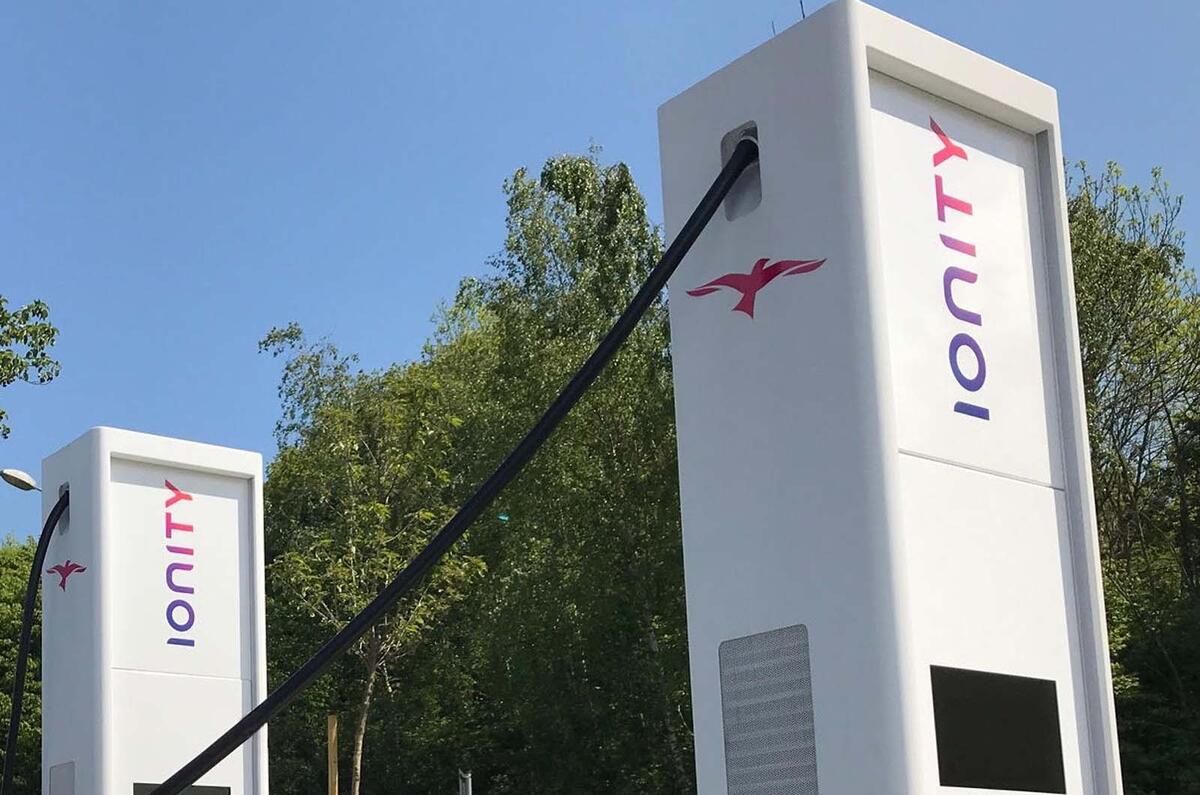EV charging network Ionity, backed by BMW, Daimler, Ford and the VW Group, has partnered with Extra MSA Group to expand its network of fast chargers at motorway service stations across the UK.
Up to six 350kW fast chargers will be installed at eight Extra’s motorway service areas, starting this year with the company’s £60m Skelton Lake, Leeds facility on the M1 motorway.
The scheme will later take in Extra's services at Cobham, Cambridge, Beaconsfield, Cullompton, Blackburn, Baldock and Peterborough.
Ionity says its 350kW fast chargers, first deployed in the UK last month in Kent, are capable of charging vehicles in less than 20 minutes, although no mass production EV is yet capable of charging at this speed.
Audi’s new Audi E-tron electric SUV is currently the fastest charging EV on the market, at 150kW. The new Porsche Taycan, launching next year, will be the first production electric car capable of a 350kW charge rate.
The company said: “Due to their 350kW capacity and the strategic positioning of its stations, Ionity's network will make EV travel across the UK and Europe a truly hassle-free experience.”
The network aims to have opened 40 fast charging stations across the UK and 2400 charging points across Europe by the end of 2020.
Recently, Tesla unveiled a new generation of its Supercharger EV charging point, promising charge rates of 1000 miles or range per hour, and 75 miles in five minutes. The highest-speed superchargers will only be compatible with certain versions of the Tesla Model 3.
BP Chargemaster, the UK’s biggest provider of EV infrastructure, is planning to install 400 points capable of ultra-fast 150kW charging (the current maximum speed) across the UK by 2021.
Read more
BP Chargemaster unveils 150kW ultra-fast EV charger








Join the debate
Add your comment
ionity chargers @ Cam Services (off A14, near Boxworth)
I was at the site yesterday (8th June 2020) and there were four Ionity chargers, looking mere days away from being turned on.
Why doesn’t Autocar do some basic research?
the Audi eTron is not the fastest charging car available currently by quite a large margin. It is the fourth-fastest charging, so hardly worth mentioning.
1) Tesla Model 3 maximum charge rate = 250kW (66% higher than eTron)
2) Tesla Model S maximum charge rate = 200kW (33% higher than the eTron)
3) Tesla Model X maximum charge rate = 200kW (33% higher than the eTron)
4) Audi eTron maximum charge rate = 150kW
Come on Autocar, it’s not difficult to do some basic reaseach, you are ‘journalists’ after all.... It’s almost as if you’ve published Ionity information without checking it. VW/Audi are Ionity investors so they want you to print mentions of the eTron even if the facts are wrong!
To be fair Tesla UKs own
To be fair Tesla UKs own website says SC and CCS charge at 120KW and it was only quite recently that they increased the peak rate.
https://www.tesla.com/en_GB/support/charging-connectors
Audi is not fastest
Except for Tesla Model 3 which can charge at 250kW. Or 200kW at CCS like this ionity. With 50% more range added per kWh.
Come on AutoCar do your research!
Cost of energy generation expected to fall
Many expect the cost of energy generation to fall significantly. Solar may fall to close to a penny a kilowatt hour in some parts of the world. UK doesn't get quite as much sun as some places, but still should benefit. Newer kinds of solar cell such as those incorporating perovskites - in which field a UK company called Oxford PV leads the world - should be much cheaper and more flexible than the silicon solar cells which have been used until now.
I believe those running the National Grid have said there should not be a problem keeping up with demand. As regards battery capacity, mass adoption of EVs would provide storage capacity (in the cars themselves) equal to or greater than many hours running the grid at peak output, so car-to-grid tech should also be important in the future.
export payments by Octopus
Octopus pay people just 5.5p/kWh to buy their exported electricity.
On the one hand that's only 36% of the cost to buy electricity, but on the other they pay you regardless of the dynamic grid price which might actually be negative, so it's good to have a guaranteed rate!